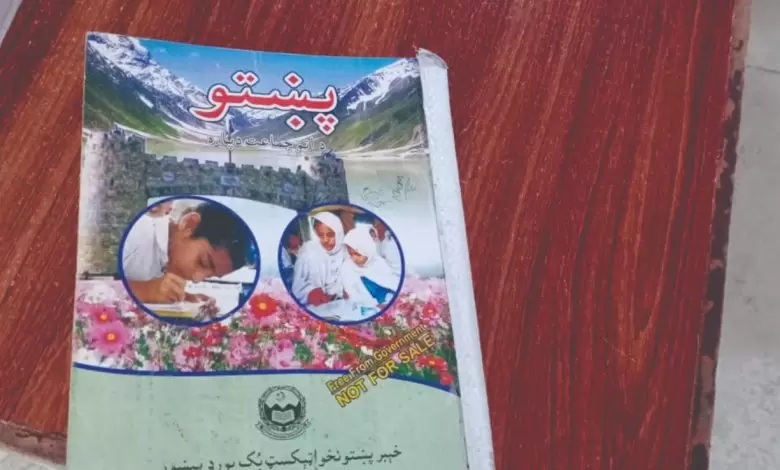
Pashto Mandate In KP Schools Faces Implementation Hurdles
He mentioned,“The teachers informed us that the directive has been issued for our class, but the textbooks are still unavailable. How can we cover the syllabus before the exams? Despite the passage of considerable time, we are still unaware of the prescribed book.”
A month ago, the education department issued written directives mandating the teaching of Pashto as a compulsory subject in all public and private schools up to the twelfth grade. However, most schools have not implemented these instructions. Senior officials expressed strong disapproval, insisting on the immediate inclusion of Pashto as a mandatory subject. They warned of disciplinary action against District Education Officers (DEOs) for failing to enforce the directive.
Maulana Khan Zeb, a prominent figure in Bajaur and a central leader of the Awami National Party, known for his contributions to Pashto language research and literature, highlighted the longstanding issue. He recalled that during the Awami National Party's government tenure in 2012, legislation was passed in the provincial assembly to integrate mother tongues into the education curriculum. Despite a court order on this matter, progress stagnated. He welcomed the recent directives issued to all districts, urging private school administrators to comply by hiring Pashto subject teachers.
Emphasizing the fundamental significance of this issue, he cited UNESCO's universal law, which recognizes every child's right to receive primary education in their mother tongue. Such an approach nurtures natural abilities and fosters creativity. He stressed the urgent need for widespread implementation of this decree across educational institutions. Incorporating Pashto language instruction in all schools would not only bolster the language but also create employment opportunities for educated youth and enable children to learn and read in their mother tongue, thereby enhancing the educational experience.
The“Mother Tongues” platform, comprising representatives from all languages of Pakhtunkhwa, has been advocating for the implementation of the Regional Languages Authority Act for several months.
Hayat Roghani, a prominent figure on this platform and founder of the major broadcasting network Mafkoora, reported progress resulting from their sustained efforts. However, he noted that while Pashto, Hindko, Saraiki, and Khowar syllabi had been developed in compliance with the decree issued on January 26, 2023, syllabi for Kohistani or Shina languages were yet to be developed.
District Education Officer Bajaur, Arbab Shereenzada, confirmed receiving directives on the matter, stating that they promptly responded by issuing instructions to all schools to include Pashto as a compulsory subject in all classes up to the 12th grade. However, implementation in classes 9th to 10th appears challenging currently due to staffing constraints in high schools across the district.
Nevertheless, opportunities exist for classes below the eighth grade, as well as for first and second-year students, with teaching initiated in some but not all schools. Issues such as lack of teachers, textbooks, and scheduling complications persist. The mandate has been enforced across all schools, with hopes that these challenges will be resolved by the next academic year.
Dr. Fitrat Buneri, the station director of Radio Pakhtunkhwa Bajaur, emphasized the importance of teaching in mother tongues, citing developed countries where basic education is imparted in local languages. He underscored that mastery of the mother tongue facilitates learning other languages and lamented that neglecting these languages could lead to their demise, akin to Sanskrit's obscurity in contemporary times.
Buneri emphasized that education's primary goal is comprehension, which is best achieved through instruction in the mother tongue. He warned that teaching another language at the elementary level could hinder understanding and waste time. He expressed confidence that integrating mother tongues into the curriculum would elevate educational standards.
Haji Bakht Munir, the Head of Government Middle School Tani Mamund, welcomed the decision, noting that while Pashto is currently taught in fifth and eighth grades, there is no provision in other classes. He anticipated regular inclusion of Pashto in all grades from the next academic year, which would significantly benefit students.
Noor Rehman, President of the All Private Schools Association Bajaur, acknowledged receiving directives from the Education Department but cited challenges in implementing them midway through the academic year. He mentioned that teaching had commenced where space allowed but expressed optimism about regularizing Pashto instruction in all classes from the next academic year.
Regarding the protection of regional languages, a former Member of the Provincial Assembly, Dr. Sumaira Shams, criticized the Department of Culture for delayed implementation, attributing it to inadequate fulfillment of responsibilities.
She stressed the legislative responsibility of the provincial assembly in enacting and overseeing the implementation of laws, urging parliamentarians to monitor and ensure facilities for the people, for whom they were elected.

Legal Disclaimer:
MENAFN provides the
information “as is” without warranty of any kind. We do not accept
any responsibility or liability for the accuracy, content, images,
videos, licenses, completeness, legality, or reliability of the information
contained in this article. If you have any complaints or copyright
issues related to this article, kindly contact the provider above.


















Comments
No comment